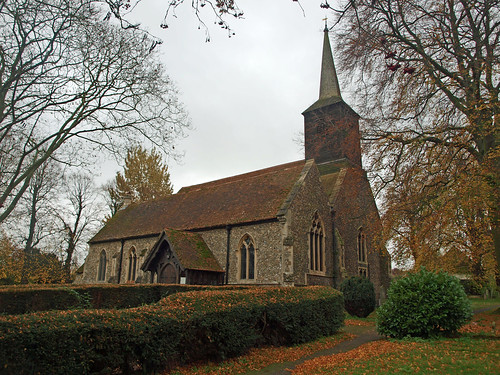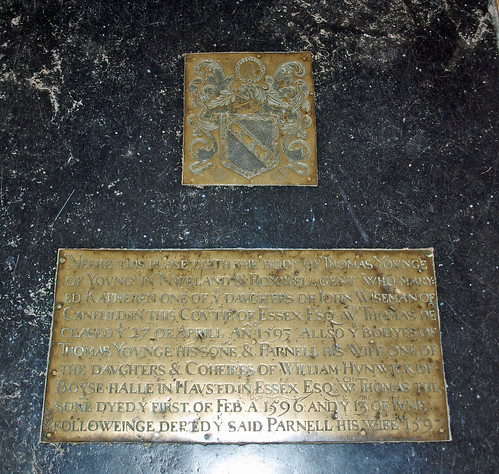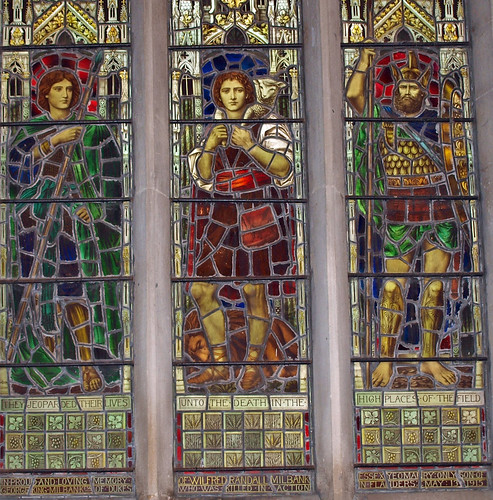St Michael and All Angels was an accidental visit in that I only came across it because I got lost (my sat nav went down) looking for Berners Roding and for this sign alone I'm glad I did:
Over restored, lacking in monuments, for its size, and of limited architectural interest it may be; I care not - that notice in the porch sums up everything right about a vicar and his congregation and their attitude to their church. I love Roxwell and all who sail in her because of a handwritten A4 notice!
ST MICHAEL AND ALL ANGELS. C14 nave and chancel, restored out of recognition. The N aisle was added in 1854, the belfry in 1891. - SCREEN. The screen consists of parts of the organ case of Durham Cathedral, built in 1684, and given to Roxwell by a former Precentor of the cathedral. The pieces exhibit that characteristic mixture of Baroque, and Gothic which had been made fashionable at Durham by Bishop Cosin in the second third of the C17. The cornice has Baroque leaves, but the posts are decorated with bits of Gothic tracery. - STAINED GLASS. Two panels of 1600, with various biblical stories and a text in German. Each panel only the size of page in a book of hours. - PLATE. Cup of 1695; Paten of 1698. - MONUMENT. Mrs Mary Byng d. 1744. Stone obelisk and in front of it a cherub leaning on an oval portrait medallion. The monument is placed across the SW corner of the chancel and seems to be unsigned.
ST MICHAEL AND ALL ANGELS. C14 nave and chancel, restored out of recognition. The N aisle was added in 1854, the belfry in 1891. - SCREEN. The screen consists of parts of the organ case of Durham Cathedral, built in 1684, and given to Roxwell by a former Precentor of the cathedral. The pieces exhibit that characteristic mixture of Baroque, and Gothic which had been made fashionable at Durham by Bishop Cosin in the second third of the C17. The cornice has Baroque leaves, but the posts are decorated with bits of Gothic tracery. - STAINED GLASS. Two panels of 1600, with various biblical stories and a text in German. Each panel only the size of page in a book of hours. - PLATE. Cup of 1695; Paten of 1698. - MONUMENT. Mrs Mary Byng d. 1744. Stone obelisk and in front of it a cherub leaning on an oval portrait medallion. The monument is placed across the SW corner of the chancel and seems to be unsigned.
ROXWELL. Here lived for some years the poet Francis Quarles, born in 1592 at Romford. Here he must have written much of his religious poetry, the Emblems which Charles Stuart loved to read. Some of Roxwell’s charming old houses and farms were standing in his day, and four of his eighteen children were baptised in this church. It was built in the 14th century and much altered in the 19th, when the tracery of some of its old windows found a strange new home in the churchyard wall. The modern bell-turret stands on 15th century posts, the new screen has 17th century woodcarving from the organ case of Durham Cathedral, and there is an oak settle in which Quarles may have sat. There is interesting 16th century glass in the west window. One picture shows the Nativity, round it being the Annunciation, Mary and Elizabeth, Humility, and other Virtues. Another shows the Resurrection with the soldiers fleeing terrified, and round it like miniatures are scenes from the life of Our Lord. One who died for us in France has the tribute of three heroic figures standing in a window, David and Jonathan and Judas Maccabaeus. A draped marble in the chancel tells of two Sir John Bramstons in the 17th century, the father a distinguished judge, the son a lawyer too. A stone portrait watched over by an angel shows Mary Byng, an 18th century heiress.
Flickr set.




No comments:
Post a Comment